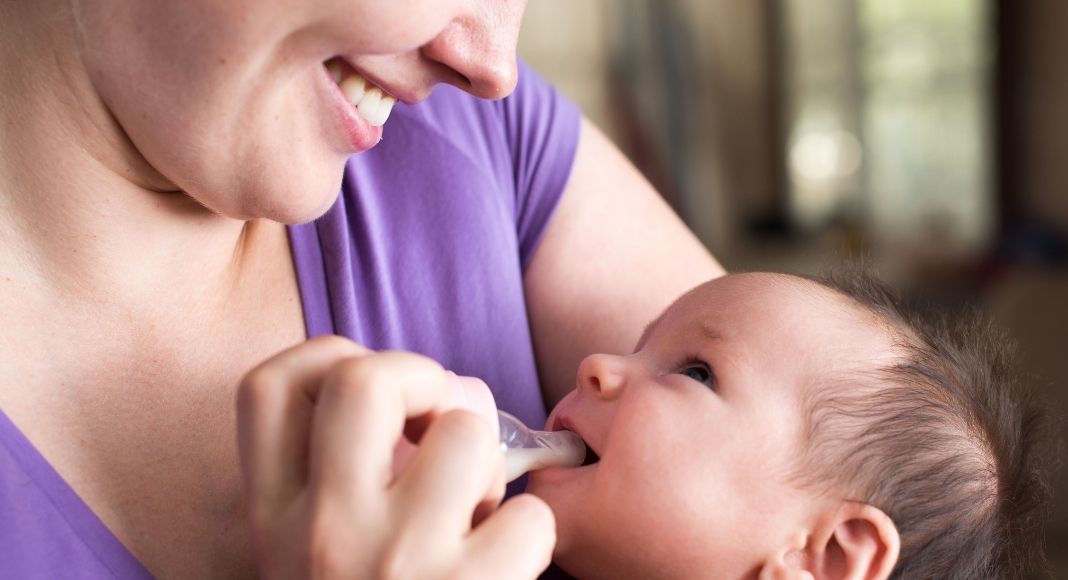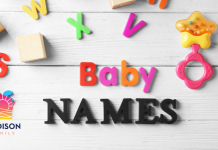 [dropcap]I[/dropcap]’ll admit that I always dread August a little bit. As a mom who struggled with breastfeeding and ended up spending hundreds of hours pumping tiny quantities of milk in order to combo feed both my babies, National Breastfeeding Month can poke at some challenging emotions.
[dropcap]I[/dropcap]’ll admit that I always dread August a little bit. As a mom who struggled with breastfeeding and ended up spending hundreds of hours pumping tiny quantities of milk in order to combo feed both my babies, National Breastfeeding Month can poke at some challenging emotions.
So while there is value in celebrating breastfeeding, it’s important to remember that this month can be hard for moms who aren’t breastfeeding. So, in honor of those of us who aren’t breastfeeding, who long to breastfeed, or are struggling with it, here are 10 things to keep in mind this month (and any month, for that matter).
1. Breast isn’t always best.
While breastfeeding has benefits, it isn’t always the best choice for every mom and every baby. There are lots of reasons moms don’t breastfeed. Maybe they can’t or maybe they don’t want to. The reason doesn’t matter. Mamas, feed your baby the way that is best for you, your baby, and your family. You don’t owe anyone an explanation about your feeding choice.

2. Happy, healthy moms are best for babies.
Trying to breastfeed my first baby almost destroyed me. A previous surgery impacted my milk supply, but I drove myself mad trying to breastfeed anyway. My baby wasn’t gaining weight and I was sinking deeper into postpartum depression. (Did you know that breastfeeding difficulties are linked with higher rates of PPD?)
So, take care of yourself. Your baby needs you—all of you—not just your milk. Make self-care a priority.
3. We need to broaden the definition of breastfeeding.
Breastfeeding—if you choose to feed your baby that way—isn’t all or nothing. When I wasn’t able to exclusively breastfeed my babies, I chose to pump and combo feed both breast milk and formula.
Bottles, breast, combo feeding, pumping, using donated milk—these are all ways babies are breastfed. If you want to breastfeed, it’s likely you can find a way to do it—as long as you broaden your definition of what breastfeeding means.
4. Formula is Miracle Science Milk and it’s a literal lifesaver.
Formula gets a bad rap that it doesn’t deserve. And I’m guilty of demonizing it (before I needed it, that is!), too. I actually cried when a lactation consultant suggested supplementing with formula. Poison, I thought.
But, as it turns out, formula (for those of us in places with access to clean water) is nothing short of a lifesaver. At my house we call it Miracle Science Milk. My babies drank gallons and gallons of it and they continue to be beautiful, healthy children. For more information on formula, check out this article.
5. It’s totally okay to CHOOSE not to breastfeed.
Breastfeeding is a choice. And it’s 100% okay to choose not to breastfeed. I’ve said it before and I will say it again, you don’t need to explain your feeding choices to anyone. If you don’t want to breastfeed, don’t breastfeed. Permission to formula feed granted.
6. If you need support, find the RIGHT support.
I was fortunate to have access to a lot of breastfeeding support after both my children were born. I realize that comes with the privilege of having good insurance and enough money to work with private lactation consultants (who were surprisingly affordable, to be honest).
 However, the support wasn’t always what I needed. It took me a couple tries to find the right lactation consultant who really understood my situation and helped empower me to make the choices that were right for me. And I realized certain breastfeeding support groups weren’t going to be the right fit for my situation either.
However, the support wasn’t always what I needed. It took me a couple tries to find the right lactation consultant who really understood my situation and helped empower me to make the choices that were right for me. And I realized certain breastfeeding support groups weren’t going to be the right fit for my situation either.
So, if your support (for whatever feeding choice you’ve made) isn’t working, look elsewhere. Chances are, the right help is out there.
7. Know that the benefits of breastfeeding are sometimes overhyped.
As I looked into it, I realized that some of the claims made about the benefits of breastfeeding are sometimes exaggerated.
In fact, when breastfeeding studies take into account other factors like socioeconomic and educational backgrounds of the mothers, the results aren’t as dramatic as they’ve been made out to be. In fact, a recent study showed that breastfeeding doesn’t have much impact on long-term cognitive development and behavior at all. And much of the research on other long-term benefits of breastfeeding show pretty underwhelming results. Other recent research has shown that it’s actually a woman’s intent to breastfeed that seems to correlate with improved outcomes (regardless of if she ends up breastfeeding successfully).
I am not saying breastfeeding doesn’t have legitimate, documented benefits. It totally does! There are many benefits for mom and baby, but with all the other things that go into raising a child, breastfeeding is likely not going to be the determining factor in your child someday winning a gold at the Olympics or getting accepted to Harvard.
8. Be selective with social media.
For moms who aren’t breastfeeding (for any reason) and especially those who are struggling with breastfeeding or longing to breastfeed, certain social media accounts can bombard one’s newsfeed with discouraging messages.
Encouraging and celebrating breastfeeding is wonderful, but for those of us who are struggling, those messages can be painful. It’s totally okay to unsubscribe from or to unfollow pro-breastfeeding accounts, especially ones that aren’t inclusive of all feeding situations.
If you’re pumping, formula feeding, combo feeding, or using donor milk, there are groups and accounts to follow and join that will encourage and support you in your feeding journey. Find those and soak in their encouraging messages!
9. Tackle assumptions.
One thing that really bothered me with both my babies was the assumption by other people that I was breastfeeding. People would ask how breastfeeding was going (without even asking if I had chosen to breastfeed) or tell sweet stories about breastfeeding their babies and assure me that would be my experience.
Pro tip: If you want to ask a new parent about how feeding their baby is going, ask them how feeding their baby is going. It’s safe to assume that all new parents feed their babies. It’s not safe to assume how they do it. And those assumptions can make for painful and uncomfortable moments.
And if someone makes assumptions about your feeding choices, it is okay to handle them however you feel comfortable with. In some cases, I’d just nod and smile. Other times, I’d just be honest and confident and state (without any further explanation) that we are using bottles to feed our baby. Sometimes, I’d put the whole story of our feeding journey on the table. Do what feels okay to you, depending on the situation.
10. Don’t be so hard on yourself. You’re doing great!
While we’re talking assumptions, let yourself off the hook about your own assumptions about breastfeeding. It’s easy to think that all the other moms are magical milk machines, peacefully breastfeeding their babies with an angelic glow surrounding them. But that’s simply not reality. In fact, according to the American Academy of Pediatrics and the CDC, 80% of new mothers expect to breastfeed, but only about 50% are exclusively breastfeeding at 3 months. By 6 months, that number is closer to 25%.
Breast, bottle, breast milk, formula . . . however you’re feeding your baby—as long as it works for you and baby—is okay. You’re doing a great job—keep it up, mama!













Great post. I am stealing “miracle science milk”!!
When I gave birth to my now-2-year-old I thought that breastfeeding would start at the hospital and just continue from there. I guess I thought all I had to do before his birth was decide whether or not I wanted to breastfeed. Turns out my milk seemed to be there but not enough of it was coming out. So my baby was fed his first bottle of formula in the middle of the night at the hospital while I cried like a baby.
Fast forward to accepting I would be combo feeding and now settled at home, I found invaluable support and (factual) information at babyformulaexpert.com, website and YouTube channel.
All the best to you mommas in your feeding journey!